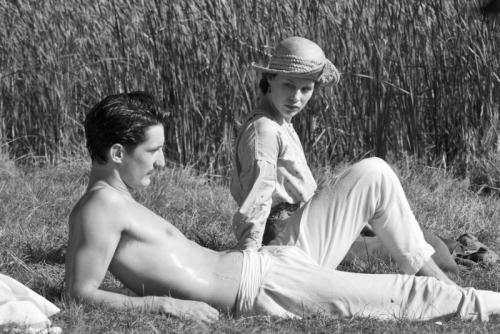Reviews - Frantz
Frantz
Reviewed By John Porter

Frantz
"Who is the Frenchman at the German's grave?" The tagline for Francois Ozon's 'Frantz' (2016) asks. Based on the same framework as Lubitsch's 1932 movie, 'Broken Lullaby', 'Frantz' examines ideas of loss, mourning, guilt, and forgiveness in the wake of the First World War.
The story begins in the German town of Quedlinburg. It is 1919 and Anna (Paula Beer) visits the grave of her fiance, Frantz Hoffmeister, who has been killed in the trenches of the Western Front. One day she notices a stranger (Pierre Niney) leaving flowers at the graveside, and later this same stranger attempts to speak to Frantz's grieving father, Hans, so revealing himself to be French. The wounds however have not yet healed within Hans, and he sends the young man away, telling him in a rage that a Frenchmen killed his son. Anna perseveres, inviting him back to the house where he tells the bereaved family that his name is Adrien and that he and Frantz were friends in Paris before the war. A tentative connection so develops between the people, united in their loss of a loved one. Adrien plays Frantz's violin for them and recounts stories of the Louvre’s Manet paintings that he and Frantz used to admire together, especially ‘Le suicide’. He spends time with Anna, the beginnings of a romance are teased, and he suffers racial abuse at the hands of the German townspeople. Yet still, as healing and hope continue inside the Hoffmeister household there remains something of a mystery lingering from the first sequences of Anna watching a stranger cry over her Frantz's body. Trust is shaky after conflict, and this atmosphere is transferred to the audience through the subtle foregrounding of the ambiguity of Adrien’s true identity.
The movie is shot in a luminous black and white, Pascal Marti's cinematography achieving stark contrasts and glorious detail, which combined with Ozon's compositions give the picture a classical, almost stately feel. Colour sequences and objects appear intermittently throughout, sometimes suddenly, sometimes faded-in, often coinciding with moments in the narrative where characters are healing deep wounds or the 'joie de vivre' spirit of life appears to be seeping back into the world.
Paula Beer and Pierre Niney give intense, internal performances characterised by quiet trauma and a yearning hope for the future, and all the suspicious, brooding pain of a post-war period are distilled into the actions of their characters. It is through their strengths as actors that the first half of the movie, that which focuses on the mystery element, is often carried. The reality of the situation is revealed partway through, which then allows the narrative focus to tighten, shedding mystery for an examination of the concepts of victor, vanquished, and guilt through spirals of lies and half-forgivenesses.
As Frantz's letters from the front are read out, the voices of both Adrien and Frantz are overlaid together, placing personal grief into the wider context of loss on a scale encompassing all nationalities. Later, as Hans' drinking buddies refuse to share beer with him because of his fraternising with a Frenchman, he tells them that, "we are the fathers who drink to the deaths of our children", recalling Roosevelt's, "war is young men dying and old men talking". Things happen cyclically in 'Frantz'; blame and hate are passed through time and generations with lies repeated as vain efforts of comfort and regrowth. In these cycles there is a tragic air to the proceedings, as if the figures moving about this vast and murky emotional landscape want nothing but love and an escape from the suffering, but are continually foiled not only by others, but by the trappings of the past and their inability to forgive themselves.
As an anti-war film, 'Frantz' is a sobering, majestic piece where pain is connected not to national guilt or the blood and fury of combat, but to the often insurmountable shock faced by ordinary people as they attempt to rebuild in the face of enormous personal upheaval.
The story begins in the German town of Quedlinburg. It is 1919 and Anna (Paula Beer) visits the grave of her fiance, Frantz Hoffmeister, who has been killed in the trenches of the Western Front. One day she notices a stranger (Pierre Niney) leaving flowers at the graveside, and later this same stranger attempts to speak to Frantz's grieving father, Hans, so revealing himself to be French. The wounds however have not yet healed within Hans, and he sends the young man away, telling him in a rage that a Frenchmen killed his son. Anna perseveres, inviting him back to the house where he tells the bereaved family that his name is Adrien and that he and Frantz were friends in Paris before the war. A tentative connection so develops between the people, united in their loss of a loved one. Adrien plays Frantz's violin for them and recounts stories of the Louvre’s Manet paintings that he and Frantz used to admire together, especially ‘Le suicide’. He spends time with Anna, the beginnings of a romance are teased, and he suffers racial abuse at the hands of the German townspeople. Yet still, as healing and hope continue inside the Hoffmeister household there remains something of a mystery lingering from the first sequences of Anna watching a stranger cry over her Frantz's body. Trust is shaky after conflict, and this atmosphere is transferred to the audience through the subtle foregrounding of the ambiguity of Adrien’s true identity.
The movie is shot in a luminous black and white, Pascal Marti's cinematography achieving stark contrasts and glorious detail, which combined with Ozon's compositions give the picture a classical, almost stately feel. Colour sequences and objects appear intermittently throughout, sometimes suddenly, sometimes faded-in, often coinciding with moments in the narrative where characters are healing deep wounds or the 'joie de vivre' spirit of life appears to be seeping back into the world.
Paula Beer and Pierre Niney give intense, internal performances characterised by quiet trauma and a yearning hope for the future, and all the suspicious, brooding pain of a post-war period are distilled into the actions of their characters. It is through their strengths as actors that the first half of the movie, that which focuses on the mystery element, is often carried. The reality of the situation is revealed partway through, which then allows the narrative focus to tighten, shedding mystery for an examination of the concepts of victor, vanquished, and guilt through spirals of lies and half-forgivenesses.
As Frantz's letters from the front are read out, the voices of both Adrien and Frantz are overlaid together, placing personal grief into the wider context of loss on a scale encompassing all nationalities. Later, as Hans' drinking buddies refuse to share beer with him because of his fraternising with a Frenchman, he tells them that, "we are the fathers who drink to the deaths of our children", recalling Roosevelt's, "war is young men dying and old men talking". Things happen cyclically in 'Frantz'; blame and hate are passed through time and generations with lies repeated as vain efforts of comfort and regrowth. In these cycles there is a tragic air to the proceedings, as if the figures moving about this vast and murky emotional landscape want nothing but love and an escape from the suffering, but are continually foiled not only by others, but by the trappings of the past and their inability to forgive themselves.
As an anti-war film, 'Frantz' is a sobering, majestic piece where pain is connected not to national guilt or the blood and fury of combat, but to the often insurmountable shock faced by ordinary people as they attempt to rebuild in the face of enormous personal upheaval.
Find A Film
Search over 1500 films in the Keswick Film Club archive.
Friends
KFC is friends with Caldbeck Area Film Society and Brampton Film Club and members share benefits across all organisations
Awards
Keswick Film Club won the Best New Film Society at the British Federation Of Film Societies awards in 2000.
Since then, the club has won Film Society Of The Year and awards for Best Programme four times and Best Website twice.
We have also received numerous Distinctions and Commendations in categories including marketing, programming and website.
 Talking Pictures
The KFC Newsletter
Talking Pictures
The KFC Newsletter
Links Explore the internet with Keswick Film Club


